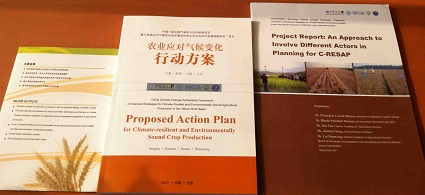China prepares farmers to face climate change

Chinese agriculture is much better prepared to deal with the threat of climate change after the successful completion a major FAO project that prepared farmers, field technicians, researchers and authorities to adapt to and mitigate the expected challenges of climate change. The project involved extensive training, demonstrations of best practices, multidisciplinary work and consultations that offered participants the opportunity to get together and exchange common concerns, ideas, best practices and technologies. The main implementing agencies of the project were research institutions that also benefitted from the opportunity to be involved in development issues that are likely to lead their research and applications well into the future.
Importantly, the project involved many female participants, including scientists from implementing agencies, policymakers in government at various levels and, perhaps most significantly, the project paid particular attention to women farmers because they are the ones most directly involved in agriculture production in the pilot provinces.
Thirteen different agro-ecosystems across the Yellow River Basin were involved in the initiative, resulting in heightened awareness that climate change mitigation and adaptation has been incorporated into national and sub-national policies, planning, and investment frameworks.
The project bolstered preparedness in three major areas: climate change policy, mitigation of the threat and vulnerability assessment and adaptation. It coordinated and strengthened mechanisms to address climate change at national and sub-national level, by establishing a national multidisciplinary team and four provincial multidisciplinary teams, which brought together experts from different sectors and institutions, encouraging collaboration in the project areas.
The capacity of the provincial multidisciplinary teams and county and provincial authorities to implement climate-resilient and environmentally sound agricultural production was improved. Training manuals on climate-resilient and environmentally sound agriculture were developed, printed and distributed. Four provincial action plans were produced using strategies, policies and technologies to adapt crop production to climate change.
Information was exchanged among officials at research and extension services and local farmers. A web-based information system was established for local, provincial and national authorities, providing a tool for coordinated action at all levels of government.
A menu of technologies and best practices was developed and applied to agro-ecosystems to increase their adaptation to climate change and reduce the negative impact of agriculture on ecosystems.
Capacity for action planning that involves different societal groups was increased. The project promoted consultation and dialogue among different groups to get an idea of what actions would help agriculture adapt to climate change and reduce pollution from agriculture.
Collaborative structures, like the multidisciplinary teams, remain in place, ready to serve on future projects and initiatives related to resilient adaptation and environmentally sound agriculture. The action plans the project developed had a major impact on provincial policy planning and even contributed to China's 12th Five-year Plan, the country's main policy blueprint going forward.
*UNJP/CPR/037/SPA: Enhanced strategies for climate-resilient and environmentally sound agricultural production in the Yellow River basin.
